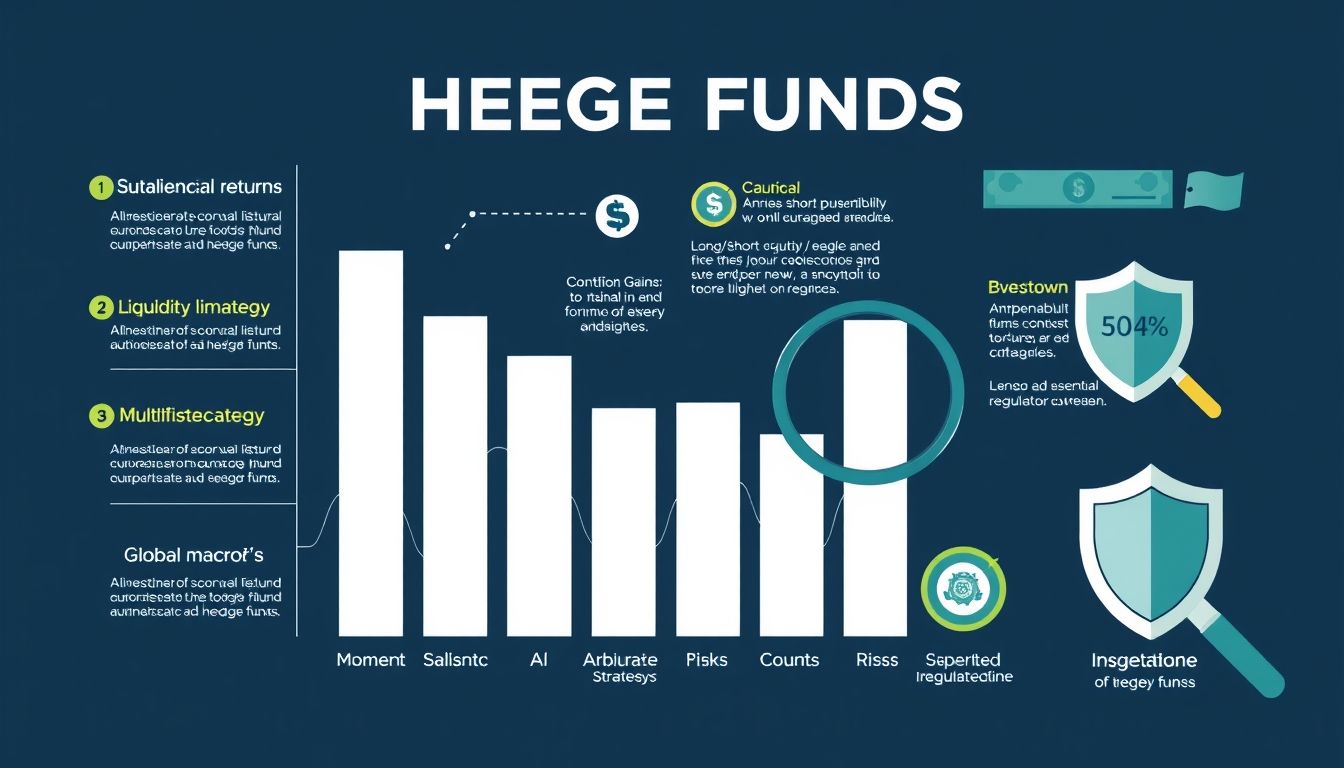مقدمة إلى صناديق التحوط: عالم العوائد المرتفعة والمخاطر المعقدة
صناديق التحوط، أو ما يعرف بـ "Hedge Funds"، هي عبارة عن صناديق استثمارية خاصة تستخدم مجموعة متنوعة من الاستراتيجيات المعقدة بهدف تحقيق عوائد مرتفعة بغض النظر عن اتجاه السوق. تختلف هذه الصناديق اختلافًا جوهريًا عن صناديق الاستثمار المشتركة التقليدية، حيث تستهدف المستثمرين ذوي الملاءة المالية العالية والمؤسسات الاستثمارية الكبيرة، وتخضع لقيود تنظيمية أقل، مما يتيح لها حرية أكبر في استخدام أدوات استثمارية معقدة مثل المشتقات المالية والبيع على المكشوف.
الفصل الأول: ما هي صناديق التحوط وكيف تعمل؟
صناديق التحوط ليست مجرد صناديق استثمارية عادية. إنها كيانات معقدة تستخدم استراتيجيات متنوعة لتحقيق عوائد عالية. تشمل هذه الاستراتيجيات:
- المضاربة بالأسهم: شراء وبيع الأسهم بناءً على توقعات قصيرة الأجل.
- التحكيم: استغلال فروق الأسعار بين الأسواق المختلفة.
- الاستثمار في الديون المتعثرة: شراء ديون الشركات المتعثرة بهدف تحقيق ربح عند إعادة هيكلتها.
- الاستثمار العالمي: الاستثمار في الأسواق العالمية المختلفة.
تعتمد صناديق التحوط على مديري محافظ ذوي خبرة عالية وقدرة على تحليل الأسواق واتخاذ قرارات استثمارية سريعة. تتقاضى هذه الصناديق رسومًا أعلى من صناديق الاستثمار المشتركة التقليدية، غالبًا ما تكون على شكل "2 و 20"، أي 2% رسوم إدارة و 20% من الأرباح.
الفصل الثاني: استراتيجيات صناديق التحوط: نظرة متعمقة
تتنوع استراتيجيات صناديق التحوط بشكل كبير، مما يسمح لها بالتكيف مع مختلف ظروف السوق. بعض الاستراتيجيات الشائعة تشمل:
- استراتيجيات الأسهم طويلة/قصيرة: شراء الأسهم التي يعتقد المدير أنها ستحقق أداءً جيدًا، وبيع الأسهم التي يعتقد أنها ستحقق أداءً سيئًا.
- استراتيجيات الأحداث: الاستثمار في الشركات التي تمر بأحداث خاصة مثل عمليات الاندماج والاستحواذ أو إعادة الهيكلة.
- استراتيجيات الماكرو العالمية: الاستثمار بناءً على التوجهات الاقتصادية والسياسية العالمية.
- استراتيجيات القيمة النسبية: استغلال الفروق في تقييم الأصول المتشابهة.
مثال: صندوق تحوط يستخدم استراتيجية الأسهم طويلة/قصيرة قد يشتري أسهم شركة تقنية يعتقد أنها مبتكرة، ويبيع أسهم شركة طاقة يعتقد أنها مهددة بالانقراض بسبب التحول إلى الطاقة المتجددة.
الفصل الثالث: المخاطر المرتبطة بالاستثمار في صناديق التحوط
على الرغم من إمكانية تحقيق عوائد عالية، إلا أن الاستثمار في صناديق التحوط ينطوي على مخاطر كبيرة، بما في ذلك:
- مخاطر السيولة: قد يكون من الصعب سحب الاستثمارات من صناديق التحوط بسرعة.
- مخاطر الرافعة المالية: تستخدم صناديق التحوط الرافعة المالية لزيادة العوائد، مما يزيد أيضًا من الخسائر المحتملة.
- مخاطر التعقيد: الاستراتيجيات التي تستخدمها صناديق التحوط معقدة وصعبة الفهم.
- مخاطر الاحتيال: هناك خطر الاحتيال من قبل مديري صناديق التحوط.
مثال: في عام 2008، تعرض العديد من صناديق التحوط لخسائر فادحة بسبب الأزمة المالية العالمية، مما أدى إلى تجميد عمليات السحب وإفلاس بعض الصناديق.
الفصل الرابع: الرسوم والتكاليف: ما الذي تدفعه مقابل العوائد المحتملة؟
تتقاضى صناديق التحوط رسومًا أعلى بكثير من صناديق الاستثمار المشتركة التقليدية. النموذج الأكثر شيوعًا هو "2 و 20"، حيث يتم فرض رسوم إدارة سنوية بنسبة 2% من إجمالي الأصول الخاضعة للإدارة، بالإضافة إلى 20% من الأرباح التي يحققها الصندوق. بالإضافة إلى ذلك، قد تكون هناك رسوم أخرى مثل رسوم الأداء ورسوم الحفظ.
مثال: إذا استثمرت 1,000,000 دولار في صندوق تحوط يتقاضى رسوم "2 و 20"، وحقق الصندوق عائدًا بنسبة 10% في عام واحد، فستدفع رسوم إدارة بقيمة 20,000 دولار (2% من 1,000,000 دولار) ورسوم أداء بقيمة 20,000 دولار (20% من 100,000 دولار أرباح)، ليصبح إجمالي الرسوم 40,000 دولار.
الفصل الخامس: التنظيم والإشراف: هل صناديق التحوط تخضع لرقابة كافية؟
تخضع صناديق التحوط لتنظيم أقل من صناديق الاستثمار المشتركة التقليدية، لكنها لا تزال تخضع لبعض القواعد واللوائح. في الولايات المتحدة، على سبيل المثال، تخضع صناديق التحوط لإشراف هيئة الأوراق المالية والبورصات (SEC). تهدف هذه اللوائح إلى حماية المستثمرين ومنع الاحتيال والتلاعب في السوق.
ومع ذلك، يرى البعض أن التنظيم الحالي غير كافٍ، وأن هناك حاجة إلى مزيد من الرقابة على صناديق التحوط لضمان الشفافية وحماية المستثمرين.
الفصل السادس: صناديق التحوط في السوق العربي: فرص وتحديات
لا يزال الاستثمار في صناديق التحوط في السوق العربي محدودًا نسبيًا، ولكنه يشهد نموًا تدريجيًا. هناك عدد قليل من صناديق التحوط التي تركز على الاستثمار في الأسواق العربية، وتستهدف المستثمرين المؤسسيين والأفراد ذوي الملاءة المالية العالية.
تشمل التحديات التي تواجه صناديق التحوط في السوق العربي:
- محدودية السيولة في بعض الأسواق.
- نقص الشفافية في بعض الشركات.
- القيود التنظيمية.
ومع ذلك، هناك أيضًا فرص كبيرة للنمو، خاصة مع تطور الأسواق المالية في المنطقة وزيادة اهتمام المستثمرين بالاستثمارات البديلة.
الفصل السابع: صناديق التحوط الإسلامية: الاستثمار المتوافق مع الشريعة
صناديق التحوط الإسلامية هي صناديق تحوط تلتزم بمبادئ الشريعة الإسلامية. تحظر هذه الصناديق الاستثمار في الأنشطة المحرمة مثل المقامرة والكحول والتبغ، وتلتزم بضوابط معينة فيما يتعلق بالرافعة المالية والديون.
تعتبر صناديق التحوط الإسلامية خيارًا جذابًا للمستثمرين المسلمين الذين يبحثون عن استثمارات متوافقة مع قيمهم الدينية.
الفصل الثامن: كيف تختار صندوق التحوط المناسب لك؟
إذا كنت تفكر في الاستثمار في صندوق تحوط، فمن المهم إجراء بحث شامل وتقييم المخاطر بعناية. إليك بعض النصائح:
- ابحث عن مدير صندوق ذي سجل حافل.
- افهم الاستراتيجية التي يستخدمها الصندوق.
- قيم الرسوم والتكاليف.
- ضع في اعتبارك قدرتك على تحمل المخاطر.
- استشر مستشارًا ماليًا.
الفصل التاسع: بدائل لصناديق التحوط: استثمارات بديلة أخرى
إذا كنت غير مرتاح للمخاطر المرتبطة بصناديق التحوط، فهناك العديد من الاستثمارات البديلة الأخرى التي يمكنك وضعها في الاعتبار، مثل:
- صناديق الاستثمار العقاري (REITs).
- الأسهم الخاصة (Private Equity).
- الاستثمار المباشر في الشركات الناشئة.
تتمتع هذه الاستثمارات البديلة بميزات وعيوب مختلفة، ومن المهم إجراء بحث شامل قبل اتخاذ أي قرار استثماري.
الفصل العاشر: مستقبل صناديق التحوط: التطورات والتوقعات
يشهد قطاع صناديق التحوط تطورات مستمرة، بما في ذلك:
- زيادة استخدام التكنولوجيا والذكاء الاصطناعي.
- تزايد الاهتمام بالاستثمارات المستدامة.
- تغير اللوائح التنظيمية.
من المتوقع أن يستمر قطاع صناديق التحوط في النمو في السنوات القادمة، ولكن من المرجح أن يشهد أيضًا تغييرات كبيرة في كيفية عمله وتنظيمه.
إخلاء المسؤولية: هذا المقال هو لأغراض إعلامية فقط ولا ينبغي اعتباره نصيحة استثمارية. يجب عليك دائمًا استشارة مستشار مالي قبل اتخاذ أي قرارات استثمارية.




